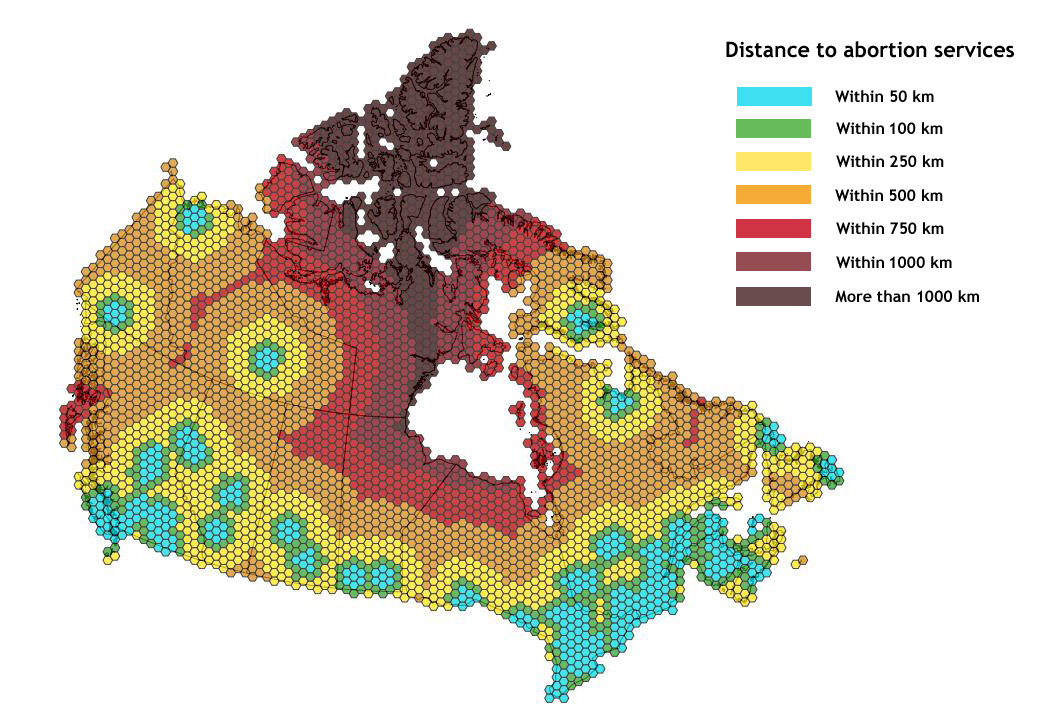Jane was pregnant and she didn’t want to be. She didn’t know where to go.

She was pursuing a graduate degree in Kamloops, B.C., studying for exams last spring when she discovered she was pregnant.
Kamloops has no abortion provider. But Jane did find a local pregnancy centre that seemed designed with her in mind — it promised “confidential, compassionate assistance and support” for someone facing an unplanned pregnancy and unsure of her options.
That assistance didn’t include referrals to abortion providers, or information about getting an abortion.
“It was kind of astounding: There’s no official abortion clinic in Kamloops, however the crisis pregnancy centre did receive $50,000 from the BC government last year,” she said.
She took a pass.
“I can only imagine what would have happened if I went to [the centre]. I probably would have punched somebody in the face.”
The clinic’s executive director Shirley Bosman said in a statement Friday the centre is “absolutely” clear up front about its stance on abortion.
“We provide medically factual information regarding all options available to women, including abortion, adoption and parenting. All Kamloops abortions are performed at the hospital and require a physician referral,” Bosman wrote.
“Every decision that a woman makes regarding her unplanned pregnancy is a lifetime decision, whether to abort, parent or place for adoption. . … It is important that she is offered the opportunity to explore all her options and be assured that her decision is respected.”
READ MORE: Abortion access still depends on who you are and where you live
- Budget 2024 failed to spark ‘political reboot’ for Liberals, polling suggests
- Train goes up in flames while rolling through London, Ont. Here’s what we know
- Peel police chief met Sri Lankan officer a court says ‘participated’ in torture
- Wrong remains sent to ‘exhausted’ Canadian family after death on Cuba vacation
A new study by the Abortion Rights Coalition of Canada argues the hundreds of crisis pregnancy centres in Canada offer misleading online advertising that bills them as something they’re not.
They style themselves as open, unbiased places where unexpectedly pregnant people can explore their options, the study says, while saying or implying that one of those options is a bad idea.
READ MORE: How abortion access varies across Canada
‘It just reinforces the stigma around abortion’
Misinformation can make it tough or impossible for people to get the care they need in a timely manner. You only have so many weeks to decide whether you want to terminate a pregnancy.
But it can also cement the idea that abortion is a horrible thing no one should talk about, says Joyce Arthur, head of the coalition and the study’s lead author.
“It just reinforces the stigma around abortion. It reinforces the shame and the silence and the guilt that women have: They’re being persuaded out of abortion, often with horror stories about what’s going to happen,” Arthur said.
“It just makes it so much harder to normalize abortion as a regular part of women’s health care, which it is. And it makes it harder to fight against prejudice and discrimination against women.”
The study reviewed websites for 166 different crisis pregnancy centres across Canada. It argues they’re “deceptive” in their marketing, “promote misinformation” and should be regulated.
Sixty per cent of the websites didn’t mention that the centre in question won’t refer people to abortion providers; 5 per cent claim there’s a link between abortion and breast cancer.
Just under half (48 per cent) mentioned negative psychological consequences of terminating a pregnancy, a kind of post-traumatic stress disorder often referred to as “post-abortion syndrome,” “which is not a medically recognized condition,” the study says.
READ MORE: Your stories on abortion access
More than two-thirds (68 per cent) of the centres studied are registered charities, the report says. There are 66 charities dedicated to crisis pregnancies and pregnancy counselling registered with the Canada Revenue Agency. Many also get direct government funding.
“A registered charity must ensure that each health care service or product it provides meets applicable requirements relating to effectiveness, and quality and safety,” Canada Revenue Agency spokesperson David Walters wrote in an email Friday.
“Where a charity furthers a promotion of health purpose through the provision of health information to the public, the information provided must be reasonably unbiased, factual and sufficiently detailed. The onus is on the registered charity to demonstrate how it meets these requirements and how it provides a charitable benefit to the public.”
None is overtly anti-abortion, although many have disclaimers nested in their websites that they provide peer, not professional counselling, and don’t provide abortion referrals or transportation to abortion providers.
“If these centres would just help women who want to help their babies, that would be great,” Arthur said.
“They should just be more honest, up front about what they’re doing.”
‘We denounce any form of deception’
Laura Lewis, a family physician and head of the Canadian Association of Pregnancy Support Services, says her members are up front already about what they do and don’t offer.
“Part of what really drew me to CAPSS was their integrity in how they present information,” she said, adding that her group’s members offer “accurate and non-inflammatory” information about options.
That includes abortion, she said, even though “we don’t believe it’s the best option for a woman.” As a matter of policy, the Christian organization’s members don’t provide abortions or refer anyone to abortion providers.
“We denounce any form of deception. … We need to be up front that we do not provide abortion services or recommend or refer for abortions,” she said.
“We don’t feel we need to hide that.”
Lewis says the scientific community “has not agreed” whether abortion increases your risk of breast cancer.
(The U.S. National Cancer Institute says “induced abortion is not associated with an increase in breast cancer risk.”)
As for “post-abortion syndrome,” Lewis says, “post-abortion grief” is a real thing.
“There are women who do experience that. That’s very real. And we see them in our centres.”
These centres don’t give women any help obtaining an abortion or contraceptive care because they can get that elsewhere, Lewis said.
That’s one of the reasons her organization exists.
“Access to abortion was so much easier and available than access to the practical support.”
READ MORE: Will Mifegymiso make abortion more accessible?
‘The government needs to start providing sufficient information’
Jane begs to differ.
Calls to clinics across the province, thousands of dollars, trips by rental car and ferry later, she terminated her pregnancy. It’s been just over a year but she’s still furious at the ordeal she went through to obtain public health care.
“It ended up being a two-month experience of just complete frustration and anxiety,” she said.
“I felt as if I had no control over my own body.”
Jane knows she was lucky to have had the resources and wherewithal to get the care she needed.
“There’s very, very little information,” she said.
“I’m in my late 20s. And I’m well educated, I have a support system, and friends who’ve gone through similar things. But a 15-year-old girl who was facing this, she would be a mother right now. And I don’t think that’s right.”
READ MORE: Where in Canada can you get an abortion? It’s secret
What’s needed most, she and Arthur argue, is easily accessible, comprehensive abortion and reproductive care information from reliable sources — provincial and federal governments, for example.
That way there wouldn’t be a vacuum of information for potentially misleading organizations to fill.
“The government needs to start providing sufficient information,” Jane said.





Comments